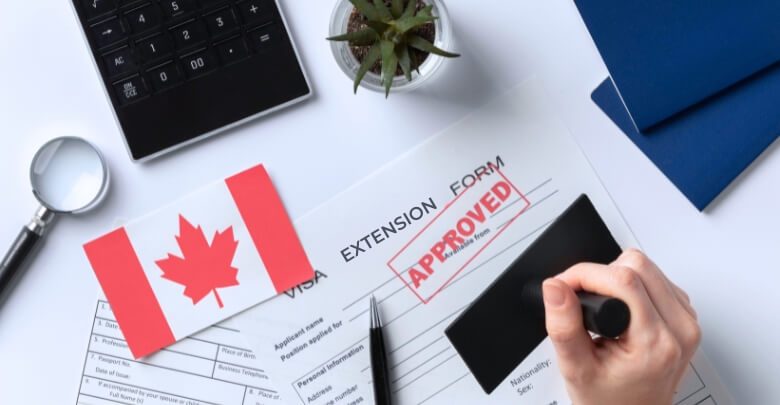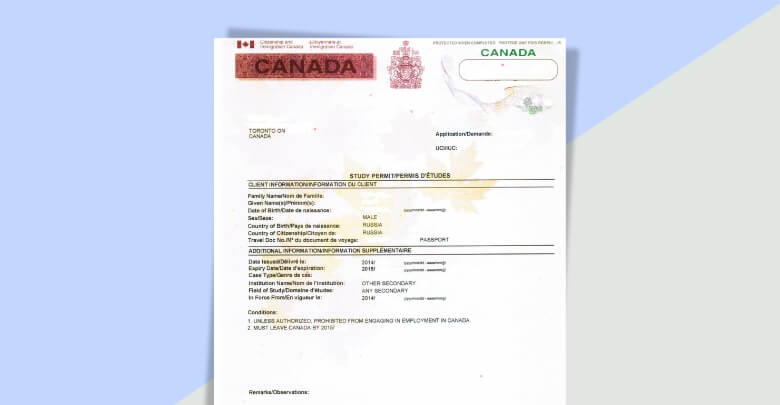There are a lot of options and pricing structures to navigate when it comes to the Canadian visa process. As travelers or immigrants, one of the main concerns is budgeting appropriately for such expenses.
If you’ve been wondering how much is a visa extension in Canada, you’re not alone.
Extending a visitor visa in Canada costs $100 per person. While other visa types are available, such as the single or multiple entry visas costing $100 per person or the family visa for five or more members priced at $500.
You can ensure a smooth, hassle-free experience by understanding the exact fee for your needs.
What Does Visa Extension Means?
Visa regulations often seem complex, yet understanding critical terms like “visa extension” can demystify the process. In international travel, visas grant foreigners permission to enter and stay in a country for a specified period, especially when attending a conference in Canada. However, circumstances might arise where individuals wish to remain beyond the approved duration.

In such cases, a visa extension becomes a sought-after solution, allowing the visa holder added time in the country. Securing this extension usually involves applying the host nation’s immigration or consulate services.
Crucially, applicants must demonstrate valid reasons for their prolonged stay, such as medical, familial, or professional obligations. Successfully obtaining this extension means the traveler can legally remain without facing penalties or deportation.
Yet, you should remember that not all visa types might be eligible for extensions. Some countries also have strict criteria or caps on the number of times one can extend. As always, staying informed and adhering to the host country’s regulations ensures a worry-free extended stay.
Different Types of Visa Extensions Available in Canada?
Extended stays in Canada require knowledge of Canada’s visa landscape. There are a variety of options available when it comes to visa extensions.
- Temporary Resident Visa Extension: Visitors in Canada may need extra time beyond their visa’s expiration. A Temporary Resident Visa (TRV) extension allows them that additional duration. Applying before the current visa’s expiration ensures legal status continuity, preventing unintended overstay issues.
- Study Permit Extension: International students pursuing education in Canada often have time-bound study permits. Should they need more time to complete their studies, a study permit extension becomes necessary. This ensures they continue their education without any immigration interruptions.
- Work Permit Extension: Foreign workers in Canada contribute significantly to its labor force. However, they must seek a work permit extension if their employment extends beyond their visa’s tenure. This step is vital to continue working legally and maintaining their resident status.
- Visitor Record Extension: Those entering Canada without a visa, typically from visa-exempt countries, are given a visitor record. A visitor record extension is their pathway if they plan to stay longer than the initial six months. With this, they can enjoy an extended, compliant stay in the country.
How Much is a Visa Extension in Canada?
With its diverse landscapes and opportunities, Canada often beckons visitors to extend their stay. Here’s how this process works financially. Traveling or residing in a foreign country necessitates budgeting, especially for unexpected extensions. For individuals in Canada under various visa categories, understanding the extension costs is pivotal. As per the latest data, extending a visitor visa in Canada costs $100 per person.
But not just individual travelers; families too might contemplate prolonging their Canadian adventure. For a family of five or more, opting for a single or multiple entry visa extension costs $500, provided all family members apply simultaneously. This bundled rate eases the financial burden on families seeking more extended stays.
While these are standard rates, updating the latest figures from official sources is essential. Canada’s immigration landscape, like many nations, can undergo policy and fee changes. Staying abreast of the newest information ensures a seamless extension process without any hitches.
Requirements for Visa Extension in Canada
Extending one’s stay in Canada requires careful adherence to specific requirements. Grasping these guidelines ensures a seamless extension process.
Valid Current Status
To apply for an extension, one must hold a valid visa status. This means the current visa should be valid. Using before the expiration ensures continuity and avoids illegal stay complications.
Reason for Extension
Canada Immigration requires a clear rationale for the extension request. Whether for tourism, family, or medical reasons, the purpose must be well-defined. A persuasive and honest explanation increases approval chances.
Proof of Financial Support
Visitors must demonstrate their capability to finance their extended stay. This includes daily expenses, accommodation, and return travel. A bank statement or sponsorship letter can be compelling proof.
Medical Examination (if needed)
Certain circumstances necessitate a medical examination. For instance, if one has lived in specific countries or territories for six consecutive months. This ensures health compliance with Canadian standards.
Clear Criminal Record
Maintaining a clean slate is essential for visa extension approvals. Canada might conduct background checks to verify this. Any criminal discrepancies can jeopardize extension chances significantly.
Remember, while these are foundational requirements, each case can have unique elements. It’s advisable to consult official sources or immigration experts for comprehensive guidance tailored to specific circumstances.
How to Apply for a Visa Extension in Canada?
Seeking more time in Canada? Following a step-by-step approach simplifies the visa extension application process.
Step 1: Check Your Current Visa Status
Before initiating the process, determine the expiration date of your current visa. It’s pivotal to apply before this date to ensure legal continuity. Delaying beyond expiration can lead to potential complications.
Step 2: Gather Necessary Documents
This includes valid passports, current visa copies, financial proofs, and other relevant identification. Each document should be recent and authentic. Misrepresentations or outdated records can hinder the application process.
Step 3: Determine Your Extension Reason
Clearly articulating why you need the extension is crucial. This could be for tourism, family visits, health issues, or other valid reasons. Be genuine; honesty enhances your application’s credibility.
Step 4: Complete the Appropriate Application Form
The Immigration, Refugees, and Citizenship Canada (IRCC) website offers specific forms for different visa extensions. Fill out the relevant form meticulously, avoiding omissions or errors. Print, sign, and date the form once completed.
Step 5: Pay the Processing Fee
Visa extension has associated fees that vary depending on the visa type. Payments are usually made online through the IRCC portal. Ensure to obtain and save the payment confirmation.
Step 6: Submit Your Application
This can be done online or via mail, depending on your preference and the visa category. Ensure all documents, payment confirmations, and forms are included. A confirmation receipt will be provided post-submission.
Step 7: Monitor Application Status
Once submitted, you can track your application’s progress online. The IRCC might contact you for additional documents or information. Respond promptly to ensure application momentum.
Always remember rules and processes can evolve. Consult the official IRCC website or trusted immigration advisors for the most updated information before applying.
Perks of Extending Your Visa in Canada
Canada offers a myriad of experiences, making visa extensions appealing to many. Here are some compelling perks of prolonging your Canadian stay:
- Extended Exploration: Canada’s vast expanse boasts diverse landscapes and cities. An extended visa provides more time to traverse and appreciate its beauty.
- Deeper Cultural Immersion: Beyond tourist spots, longer stays allow for deeper cultural engagements. This fosters connections and enriches the overall travel experience.
- Opportunities for Work: An extended visa can pave the way for short-term employment. This supplements travel expenses and offers a taste of Canadian work culture.
- Continued Education: Visa extensions mean uninterrupted studies for students. It ensures academic continuity and can open doors to further courses or degrees.
- Strengthened Relationships: Prolonging one’s stay aids in nurturing relationships, whether family or friends. Extended time together can forge stronger bonds and create lasting memories.
- Flexibility in Plans: Unexpected events can disrupt travel itineraries. A visa extension grants the leeway to adjust plans without rushing or compromising experiences.
Opting for a Conference visa extension in Canada is not merely about added days; it’s about amplifying the richness of the Canadian experience.
Final Thoughts
As visitors bask in Canada’s beauty and opportunities, the certainty of visa expiration dates approaches. Many face a predicament, but fortunately, Canada’s immigration system offers a clear and structured pathway to extend your stay. A crucial question surfaces at this juncture: how much is a visa extension in Canada?
As outlined, the cost for an individual to extend a visitor visa in Canada is $100 per person. For families of five or more aiming to explore the Canadian wilderness or urban life a bit longer, a collective fee of $500 is applicable when applying together.
These fees are designed to be straightforward, alleviating the financial guesswork in planning your extended stay. Thus, the process becomes less about the costs and more about the invaluable experiences that a more extended vacation in Canada promises.







